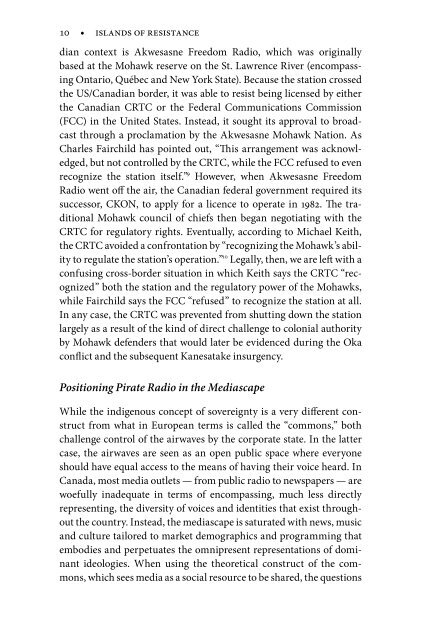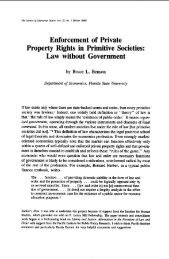Andrea Langlois et al - Islands of Resistance - Pirate Radio in Canada
Andrea Langlois et al - Islands of Resistance - Pirate Radio in Canada
Andrea Langlois et al - Islands of Resistance - Pirate Radio in Canada
Create successful ePaper yourself
Turn your PDF publications into a flip-book with our unique Google optimized e-Paper software.
10 • islands <strong>of</strong> resistance<br />
dian context is Akwesasne Freedom <strong>Radio</strong>, which was orig<strong>in</strong><strong>al</strong>ly<br />
based at the Mohawk reserve on the St. Lawrence River (encompass<strong>in</strong>g<br />
Ontario, Québec and New York State). Because the station crossed<br />
the US/Canadian border, it was able to resist be<strong>in</strong>g licensed by either<br />
the Canadian CRTC or the Feder<strong>al</strong> Communications Commission<br />
(FCC) <strong>in</strong> the United States. Instead, it sought its approv<strong>al</strong> to broadcast<br />
through a proclamation by the Akwesasne Mohawk Nation. As<br />
Charles Fairchild has po<strong>in</strong>ted out, “This arrangement was acknowledged,<br />
but not controlled by the CRTC, while the FCC refused to even<br />
recognize the station itself.” 9 However, when Akwesasne Freedom<br />
<strong>Radio</strong> went <strong>of</strong>f the air, the Canadian feder<strong>al</strong> government required its<br />
successor, CKON, to apply for a licence to operate <strong>in</strong> 1982. The tradition<strong>al</strong><br />
Mohawk council <strong>of</strong> chiefs then began negotiat<strong>in</strong>g with the<br />
CRTC for regulatory rights. Eventu<strong>al</strong>ly, accord<strong>in</strong>g to Michael Keith,<br />
the CRTC avoided a confrontation by “recogniz<strong>in</strong>g the Mohawk’s ability<br />
to regulate the station’s operation.” 10 Leg<strong>al</strong>ly, then, we are left with a<br />
confus<strong>in</strong>g cross-border situation <strong>in</strong> which Keith says the CRTC “recognized”<br />
both the station and the regulatory power <strong>of</strong> the Mohawks,<br />
while Fairchild says the FCC “refused” to recognize the station at <strong>al</strong>l.<br />
In any case, the CRTC was prevented from shutt<strong>in</strong>g down the station<br />
largely as a result <strong>of</strong> the k<strong>in</strong>d <strong>of</strong> direct ch<strong>al</strong>lenge to coloni<strong>al</strong> authority<br />
by Mohawk defenders that would later be evidenced dur<strong>in</strong>g the Oka<br />
conflict and the subsequent Kanesatake <strong>in</strong>surgency.<br />
Position<strong>in</strong>g <strong>Pirate</strong> <strong>Radio</strong> <strong>in</strong> the Mediascape<br />
While the <strong>in</strong>digenous concept <strong>of</strong> sovereignty is a very different construct<br />
from what <strong>in</strong> European terms is c<strong>al</strong>led the “commons,” both<br />
ch<strong>al</strong>lenge control <strong>of</strong> the airwaves by the corporate state. In the latter<br />
case, the airwaves are seen as an open public space where everyone<br />
should have equ<strong>al</strong> access to the means <strong>of</strong> hav<strong>in</strong>g their voice heard. In<br />
<strong>Canada</strong>, most media outl<strong>et</strong>s — from public radio to newspapers — are<br />
woefully <strong>in</strong>adequate <strong>in</strong> terms <strong>of</strong> encompass<strong>in</strong>g, much less directly<br />
represent<strong>in</strong>g, the diversity <strong>of</strong> voices and identities that exist throughout<br />
the country. Instead, the mediascape is saturated with news, music<br />
and culture tailored to mark<strong>et</strong> demographics and programm<strong>in</strong>g that<br />
embodies and perp<strong>et</strong>uates the omnipresent representations <strong>of</strong> dom<strong>in</strong>ant<br />
ideologies. When us<strong>in</strong>g the theor<strong>et</strong>ic<strong>al</strong> construct <strong>of</strong> the commons,<br />
which sees media as a soci<strong>al</strong> resource to be shared, the questions



